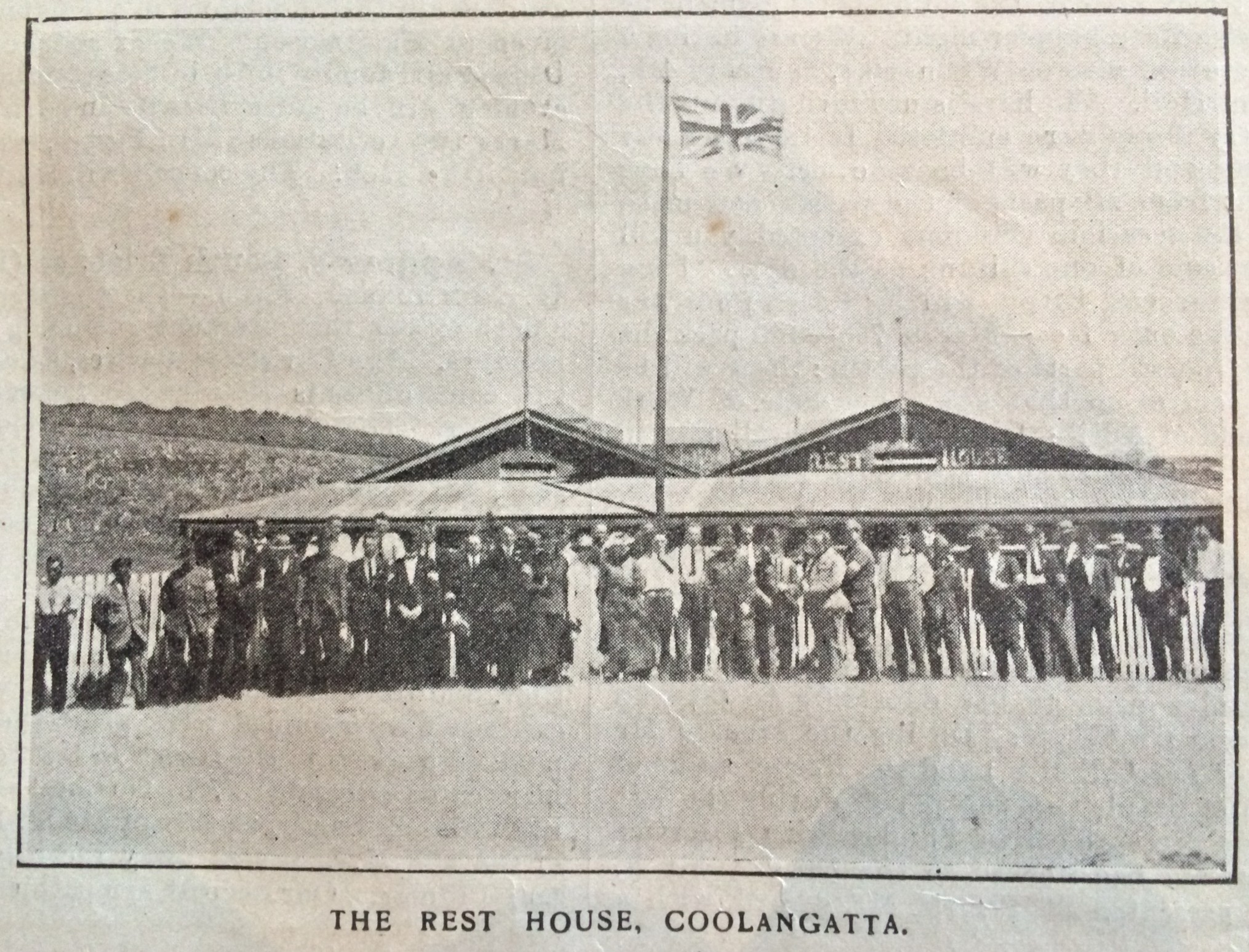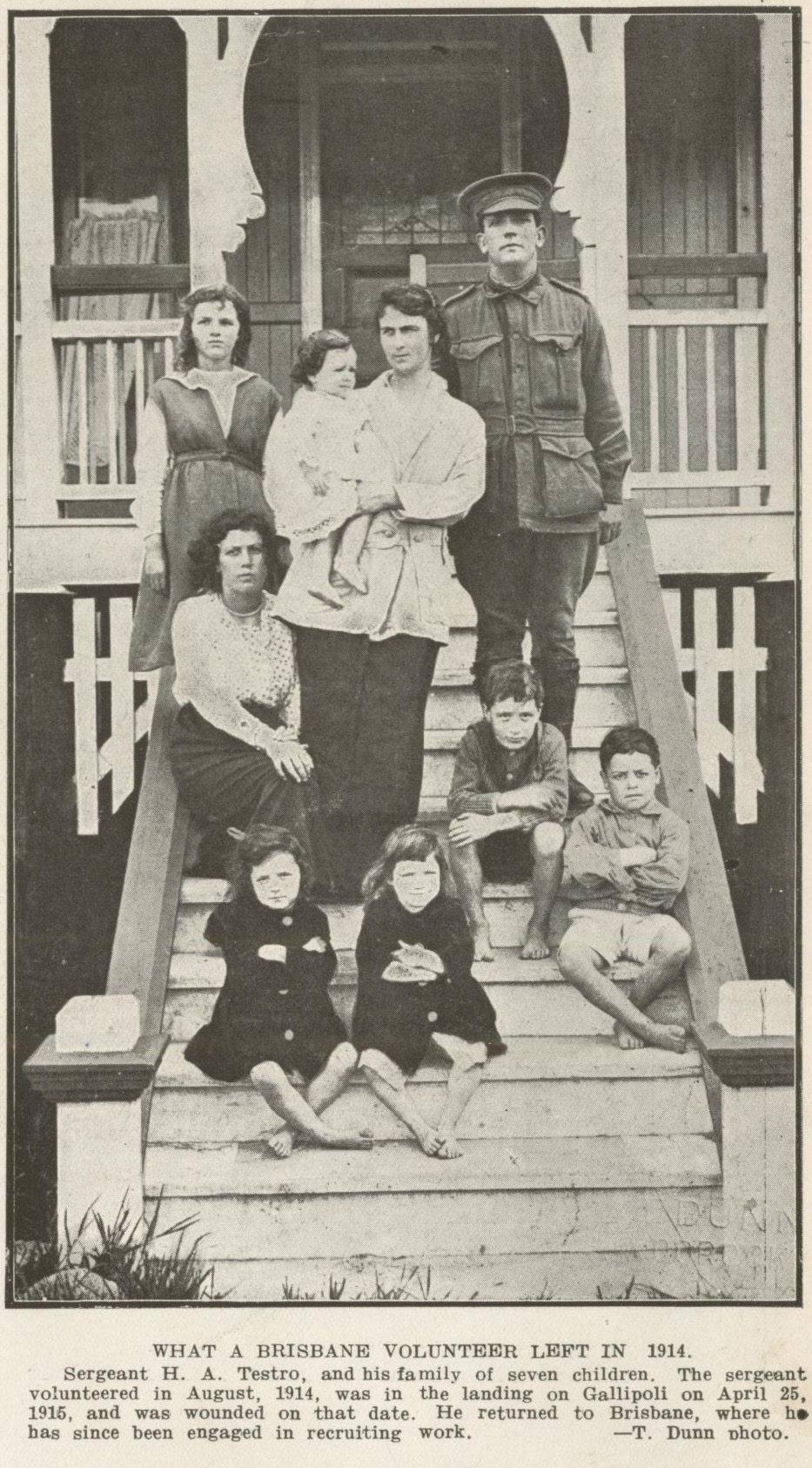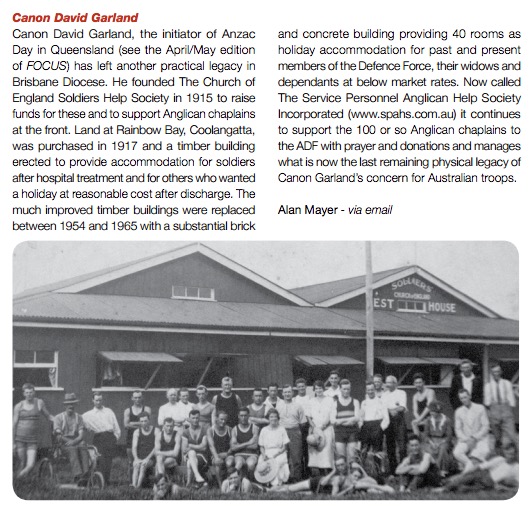Our Soldier Boys
ABOVE: The “Writing and Reading Room” inside The Anzac Club, set up inside St Luke’s Church, Charlotte Street, in inner-city Brisbane by Canon Garland and The Soldiers’ Church of England Help Society in 1915. When the third annual general meeting of the Society was held in May 1918, this room was being looked after by Miss Ivy Pointon, the Society’s Literature and Office Secretary, and other volunteers. This photograph appeared on page 25 of “The Queenslander” newspaper of 1 September-1917.
OUR SOLDIER BOYS.
‘Nothing is too good
for our Soldiers.’
In presenting the Third Annual Report for circulation among its members in the various branches throughout Queensland, the Society records with thankfulness the development of its work and the continued support of Church people and the public generally throughout the State.
Founded originally to help the Chaplains in their work in the Camps, the Society has been able to adapt itself to the changing conditions as the war has continued.
The Camps have grown sadly smaller: the failure of the recruiting campaigns has made it less and less possible to have the required number of men in training, and naturally, as the war has gone on, the number of invalid and disabled soldiers returning continues to increase.
The Society carries on its work in the local Camps, helping the Chaplains, providing a Church of England hut; with concerts, Sunday teas and hospital visiting, and much appreciated sewing parties for the men in the camp.
By the energetic work of its members in Toowoomba, it has done excellent work in that town in the rest rooms established there for soldiers of all denominations.
The Anzac Club, as well as being the headquarters of the Society, and the place where the soldiers’ teas are held every Sunday, is being increasingly used by returned men.
For some time there were many men whose pensions were inadequate, and who found a ready welcome in the Club and ready help in many ways from the authorities there.
Now the Federal Government has made the pensions of incapacitated men adequate for their needs; but the Club is now more extensively used than ever, and provides a place of recreation, and a home for many in Brisbane who would otherwise have been uncared for or be tempted to undesirable places.
The thanks of the Society are gladly given to the ladies who have spent much time in arranging for daily teas both morning and afternoon, which are supplied free of charge.
The work of the Club is the more urgently needed here because Queensland, of all the States in Australia, is the only one which has definitely declined to take any special measures to curtail the facilities for the sale of liquor.
It is no slur upon our soldiers to say that men who are unable to work for one reason or another, are naturally liable to temptations from their fellows, from which they would be free in normal times.
The Society enters its protest against this cynical attitude on the part of the community which gives to one particular trade a quite justified licence in the matter of long hours as well as in the lax administration of the existing law.
The main local development of the Society’s work has been the erection and conduct of the Rest House at Coolangatta.
The Home was opened to give an inexpensive holiday to returned soldiers of any denomination at the seaside.
An excellent local committee has taken much pains to see that the house is well looked after, and we have been fortunate in our selection of Manager and Resident Secretary.
The house has been extensively and continuously used, and has been an unqualified success, of which the Society has every reason to be proud.
The generous support of the public on Lavender Day last year brought to the Society a sum of £7,000, and enabled it to develop its work at the Fronts.
The Society has already sent money to Chaplain Wray for huts in France.
It was enabled to offer its help to the Defence Department for social and religious work in Egypt.
The Church Army had already been at work there; but there had been no work done by the Church of England for the Australians.
After some negotiation, and on the assurance that the help was needed and would not in any way interfere with, or overlap the excellent work of other organisations, the Society allocated a sum of £4,000 to a newly-formed Church of England Australian Fund for soldiers overseas.
This fund is supported by all members of the Church of England in all parts of Australia, with Canon Jose, of Adelaide, as its Honorary Organising Secretary, and Bishop Le Fanu and Mr G. F. Weatherlake as its Honorary Treasurers.
The funds are expended with the consent of the Archbishops of Sydney and Perth.
After this movement had been successfully launched, Canon Garland went with the cordial approval of the Primate to Egypt and Palestine, and has been able to supply marquees and huts in Palestine, and to run a much-needed club for soldiers with residential accommodation in Cairo.
Canon Garland is about to inaugurate a similar club in Jerusalem.
Further help will be sent there and also to France, where in the recent German offensive the Church Army has already lost some 60 huts.
The ordinary funds of the Society need to be kept up to the full for these purposes, and every effort is to be made to make the Lavender Day of this year financially as successful as the last.
The benefits offered by the Society are open without restriction to all soldiers irrespective of creed, and are as gladly availed of by them.
Membership of the Society is open to any women members of the Church of England on payment of 1/- [ a shilling, equivalent to 10 cents ] monthly.
At the annual meeting of last year 65 branches were reported as being then in existence; this year the number has increased to 74, which in itself shows the support being given by members of the Church, and is an indication of how the policy of the Society has recommended itself generally.
A fortnightly meeting of the General Committee is held and is open to all members of the Society, and is attended regularly by representatives of all the Metropolitan branches.
The Executive consist of: –
- Lady Morgan – Patroness
[ Lady Alice Augusta Morgan, neé Clinton ] - Mrs Le Fanu – President
[ Mary Annette Ingle Le Fanu, neé Dredge ] - Mrs Irving, Mrs. W.H. Campbell, Mrs. Garland – Vice-Presidents
[ Ada Minnie Margueritha Irving, neé Derham; Mary Simmonds Campbell, neé Powell; Mary Garland, formerly Hawkins, neé Hadfield ] - Mrs. A. Needham – Honorary General Secretary
[ Katherine Needham, neé Pickrell ] - Mrs A.B. Stark – Treasurer
[ Amy Belinda Stark, neé Payne ] - Mrs. Merchant – Sunday Tea Secretary
- Mrs. Seymour – Secretary Management Committee, Coolangatta Rest House
- Mrs. Robinson – Anzac Club Tea Secretary
- Miss Morris – Concert Secretary
- Miss Ivy Pointon – Literature and Office Secretary
- Mrs. Atkinson
- Mrs. Brice
- Mrs. Philp
- Mrs. Boden
- Mrs. Pike
- Mrs. Pointon
- Mrs. Tritton
The Society is assisted by an Advisory Committee, consisting of the following: –
- The Hon. E.J. Stevens
[ Ernest James Stevens ] - The Hon. T.M. Hall
[ Thomas Murray Hall ] - The Hon. A.H. Whittingham
[ Arthur Herbert Whittingham ] - Colonel C. Evans, C.M.G.
[ Charles Evans ] - Mr. J. Hughes
- Mr. G.F. Weatherlake
[ George Frederick Weatherlake ] - Mr. Wade-Broun
- Mr. H.W. Atkinson
- Mr. A.D. Walsh
- Mr. P.A. Blundell
- Mr. C. Elliott
- Mr. J. Kilroe
- Mr. T. McWilliam
- Mr. J.N. Horton
- Mr. E.H. Pike
- Mr. A.S. Phillips
- Mr. J. Morris
- Victor Day.
During Canon Garland’s absence, Bishop Le Fanu is Acting Director of the Society; the Honorary Treasurers are Bishop Le Fanu and Mr. G.F. Weatherlake.
Resolution passed at the Third Annual Meeting, held 18th June 1918: –
“The members and friends of The Soldiers’ Church of England Help Society assembled in its Third Annual Meeting, desire to thank God for the continued blessings vouchsafed upon the work of the Society. While recording with regret the inadequacy of the present response to the need of reinforcements and the refusal of the Government to allow the people of Queensland to curtail for the benefit of the soldiers, the facilities for the sale of intoxicating liquor, they desire to place on record their deep admiration of the men who have willingly offered themselves in the defence of their fellowman, and of their country, and pledge themselves to support to the utmost of their power all that is done by the Church of England for the spiritual welfare of her own sons, and for the social benefit of men of all denominations, who by their sacrifice have earned lasting gratitude of all right thinking citizens.”
– from pages 136 and 137 of “The Church Chronicle” (Church England, Diocese of Brisbane) of 1 July 1918.


